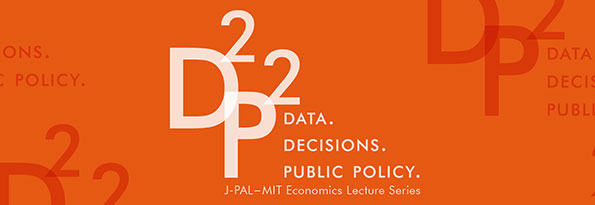J-PAL and MIT Economics launch D2P2 Lecture Series
Series explores the intersection of data, poverty, and public policy

“In this series, we want to look at the intersection of data, and specifically data around poverty, with public policy.”
—John Floretta, Associate Director of Policy for J-PAL
The MIT SHASS Abdul Latif Jameel Poverty Action Lab (J-PAL), co-founded by MIT economists Abhijit Banerjee and Esther Duflo with Harvard Professor Sendhil Mullainathan, is comprised of 140 affiliated researchers from 40-plus universities across the world. Their mission is to reduce global poverty by identifying effective, innovative, scalable programs and ensuring that public policy is informed by scientific evidence.
J-PAL researchers and partners have pursued this goal both internationally and in the United States through rigorous testing, outreach, and training. Now, with their new “D2P2: Data. Decisions. Public Policy.” lecture series, J-PAL and the MIT Economics department are aiming to increase awareness of their work right here on campus and in metro-Boston.
“In this series,” explained John Floretta, Associate Director of Policy for J-PAL, “we want to look at the intersection of data, and specifically data around poverty, with public policy. We also want to share research that we’re excited about with the rest of MIT as well as the broader development community in Boston.”
Measurement for action
On September 19, J-PAL welcomed their second speaker in the series: Dr. Rukmini Banerji, one of India’s leading experts on education policy and a longtime J-PAL partner, spoke on “Measurement for Action.”
“There are many assumptions underlying the way the Indian education system is structured,” Banerji said in her lecture. “It became time to ask how the data we had collected fit with these assumptions.”
“There are many assumptions underlying the way the Indian education system is structured. It became time to ask how the data we had collected fit with these assumptions.”
—Dr. Rukmini Banerji, CEO of Pratham
Banerji and her colleagues coordinated with J-PAL researchers on a set of studies designed to find out what types of programs were working, what wasn’t working, and why. What they found was surprising. While school attendance surpassed 95%, many students were being moved through each grade level regardless of their development.
“The expenditures on education in India have gone way up recently,” she explained, “but we don’t see any impact on learning levels.”
Further research found that grouping students by developmental level, rather than grade or age, helped improve outcomes dramatically. Banerji is now working with the Indian government to use these findings to reform the national primary education system.
More to come
J-PAL hopes to host up to three D2P2 lectures each semester. Each will feature an engaging half-hour talk by a J-PAL affiliated researcher or other leading expert, followed by audience Q&A. The speakers will address a broad array of topics, drawing on their own research and connecting it with public policy.
The next installment of D2P2 will take place on November 2 at 3:00 pm, in 54-100. Donald Green, J.W. Burgess Professor of Political Science at Columbia University, will address “The Science (and Pseudoscience) of Winning Elections,” just days before the U.S. holds its presidential election.
Lectures in the series are free and open to the public. Talks will also be streamed live online, with an opportunity for digital viewers to participate in the Q&A, and videos will subsequently be made available following the event.
For more information about the series, visit the J-PAL website.
Suggested links